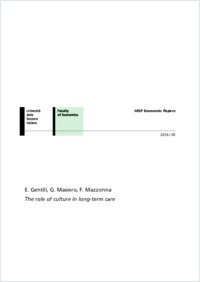The role of culture in long-term care
- Gentili, Elena Istituto di economia politica (IdEP), Facoltà di scienze economiche, Università della Svizzera italiana, Svizzera
- Masiero, Giuliano Istituto di economia politica (IdEP), Facoltà di scienze economiche, Università della Svizzera italiana, Svizzera
- Mazzonna, Fabrizio Istituto di economia politica (IdEP), Facoltà di scienze economiche, Università della Svizzera italiana, Svizzera
-
04.04.2016
34 p.
English
The aim of this paper is to assess the role of culture in shaping individual preferences to- wards different long-term care (LTC) arrangements. The analysis uses Swiss data from two administrative databases covering the universe of formal LTC providers between 2007 and 2013. Switzerland is a multi-cultural confederation where state administrative borders do not always coincide with cultural groups. For this reason, we exploit the within-state variation in cultural groups to show evidence about cultural differences in LTC use. In particular, we use spatial regression discontinuity design (RDD) at the language border between French-speaking and German-speaking individuals living in bilingual cantons to provide causal interpretation of the differences in formal LTC use between these two main cultural groups. Our results suggest a strong role of culture in shaping household decisions about formal LTC use. In particular, elderly people residing in regions speaking a Latin language (French, Italian and Romansh) use home-based care services more intensely and enter in nursing homes at older ages and in worse health conditions with respect to elderly people in German regions. This difference across the two cultural groups are driven by different preferences towards LTC arrangements
- Language
-
- English
- Classification
- Economics
- License
-
License undefined
- Open access status
- green
- Identifiers
-
- RERO DOC 259168
- ARK ark:/12658/srd1318458
- Persistent URL
- https://n2t.net/ark:/12658/srd1318458
Statistics
Document views: 362
File downloads:
- Texte intégral: 234
